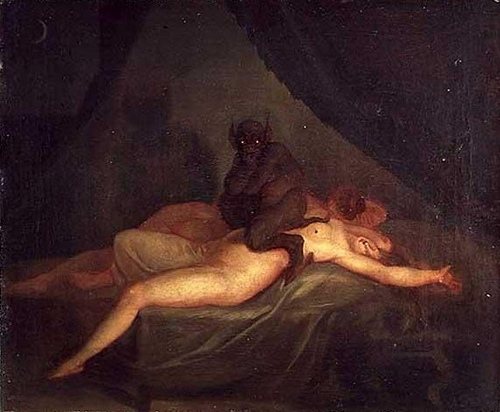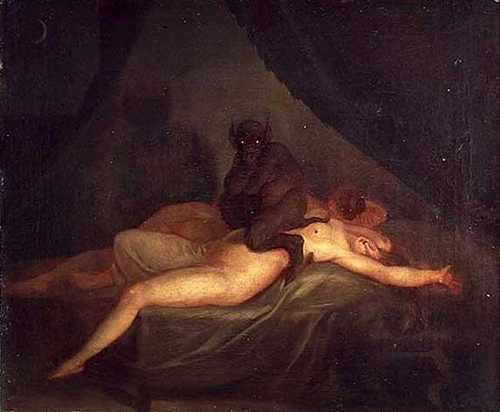Probably one of the most popular emails I receive involves the client being awakened for whatever reason, they’re not able to move or speak, they feel a weight on their chest, and they may feel a dark presence in the room. The client may even see things around the room like a ghost, spirit, demon, lights, colors, just to name a few. For anyone, this is a terrifying experience no matter who you are. As someone who dealt with this myself, I know how scary it is when your eyes open and you can’t even move, let alone let out a noise.
It should come as a relief for many that there is actually a logical explanation for this phenomenon. It’s very important to know the difference between sleep paralysis and a paranormal occurrence in this area. Of course, there are always exceptions and variables to this, but generally, this frightening experience can be explained using some logic and science.
When we sleep, our body goes through a series of different stages of sleep that involve REM (rapid eye movement) and Non-rapid eye movement (NREM). Our body cycles in and out of REM and NREM and progress through about four stages of sleep, appropriately called Stage 1-5. Our bodies typically spend the most time in the state of NREM and a shorter time in REM, which is where our dreams occur. Studies have shown that the REM stage starts about 90 minutes into sleep.
Here are the different stages of sleep
- Stage 1: Starts about 5-10 minutes into sleep, and the eyes are closed. It’s not hard to wake up from this stage, however, you won’t feel like you got any rest. Have you ever had a dream early on in your sleeping time where you trip and fall and your body jolts you awake? That’s called hypnic myoclonia. Also at this stage, the brain begins to produce theta waves, which are slow brain waves.
- Stage 2: This is a period of light sleep while the muscles relax that help you transition into a deeper sleep. This lasts about 20 minutes.
- Stage 3: This is officially the stage between light sleep and deep sleep and deeper, slow brain waves occur.
- Stage 4: This is a deep sleep that lasts about 30 minutes, and also known as delta sleep due to the delta brain waves that are occurring.
- Stage 5: The body enters into REM sleep and this is where dreaming occurs.
Now, keep in mind that the body cycles through stages of sleep, and sometimes it is out-of-order. This is all fine and dandy, but what does this have to do with sleep paralysis?
Well, when we enter the stage of REM sleep, our brain emit a chemical that paralyzes our body. This is so that we don’t physically act out our dreams. During the REM stage, our minds are very vivid with intense dreams, and it can be dangerous for our bodies to physically act out what’s going on in our minds. This chemical paralyzes everything from legs to arms, to fingers and toes.
When our body is awakened, for whatever reason, sometimes our body is still under this paralyzing chemical. Our eyes are open and we’re awake, but our body is still asleep, which can bring on the effect of feeling like you’re being pinned down. In some cases, our brains are still dreaming, which can cause hallucinations or literally seeing our dreams before our eyes.
Of course, there are always variables and exceptions. But knowing the possible explanations for this scary occurrence is very important before immediately resorting to a paranormal explanation. If you are experiencing sleep paralysis regularly, you may want to see your doctor and look into possible being tested for a sleep disorder. For me personally, I was able to stop my own sleep paralysis incidents by stopping my consumption of caffeine by noon and not watching TV immediately before bed.
But if you’re experiencing the effect of being pinned down, and seeing things before you’re even asleep, then perhaps there’s something more going on, and it would be worth it to contact a local paranormal team to ask some questions. Most importantly, rule out logical explanation before moving on to the next step. Below are some reference links with much more in-depth information, and I encourage you all to read them with a fine-toothed comb and look into more books and websites with information if this interests you.
References:
http://www.webmd.com/sleep-disorders/excessive-sleepiness-10/sleep-101
http://www.livescience.com/21653-brain-chemicals-sleep-paralysis.html
http://psychology.about.com/od/statesofconsciousness/a/SleepStages.htm



As a practicing author, I have always followed an instinctive logic it felt normal to focus on the topic -> develop
with ideas/answers -put it on paper. Yet, nothing could save me when I was writing concerning thermodynamics,
for instance, that, as you can imagine, is not my primary area
of experience. Anyhow, I took some Excellent
tips from your writing style, thanks to this:slightly_smiling_face: